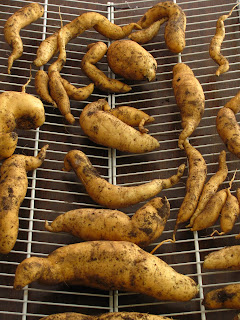An oft-repeated warning to gardeners is to avoid using produce from the grocery to start garden plants. The usual caveat is that they will have been "treated with a sprouting inhibitor." Our experience suggests otherwise. So far in the past two years we have successfuly grown garlic, ginger, Irish potatoes and sweet potatoes purchased from our usual grocer.
Garlic this year produced a bumper crop, with many heads the size of tennis balls.
Last year we produced about 8 times the weight of potatoes that we planted. I picked out several different types of spuds from the bin at Kroger. While not all of them behaved the same in our garden, all did produce potatoes. We were happiest with blue fingerlings and an elongated yellos-fleshed potato with red skin. These we will try again next season. (Due to space limitations, we only grow potatoes every other year.)
This year's success stories are ginger and sweet potatoes.
We planted two small pieces of ginger in pots last December and kept them going in the house all winter. They grew very slowly to about eight inches tall. In May, we transplanted them to one of the garden beds. After five months, we harvested just over two pounds of high-quality young ginger roots.
We rooted a sweet potato in water last February, and transplanted the slips to pots around the first of April. As soon at the weather was warm enough, we put them in the garden. Last Sunday we dug over 17 pounds of sweet potatoes.
Those big ones in the foreground are two pounds each.
We just planted shallots, also purchased at the grocery for a fraction of the price of "seed" stock. I fully expect to harvest a crop this time next year.


1 comment:
Unfortunately, I can attest to the other side of the coin. I grew potatoes from the grocery last year. I did get a great crop of tasty potatoes. But they also apparently brought blight to my garden. All my tomato plants were lost, starting directly adjacent to the potatoes. So the disease-free element of seed stock does have some legitimacy, in my experience. This year I skipped the potatoes and took steps to combat blight, which can survive in the soil for years. For the other blight fighters, try Actinovate (a new bacterial treatment for common diseases) and Legend variety of tomato (a blight resistant strain). This year no blight and a huge crop of tomatoes. Legend is great sliced or roasted/boiled for sauce or paste. Delish!
Post a Comment